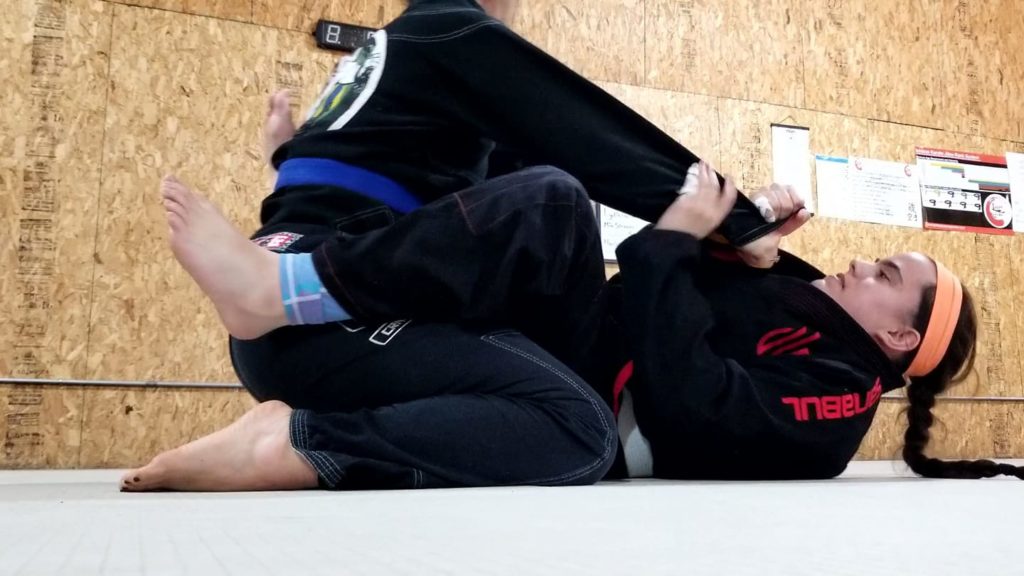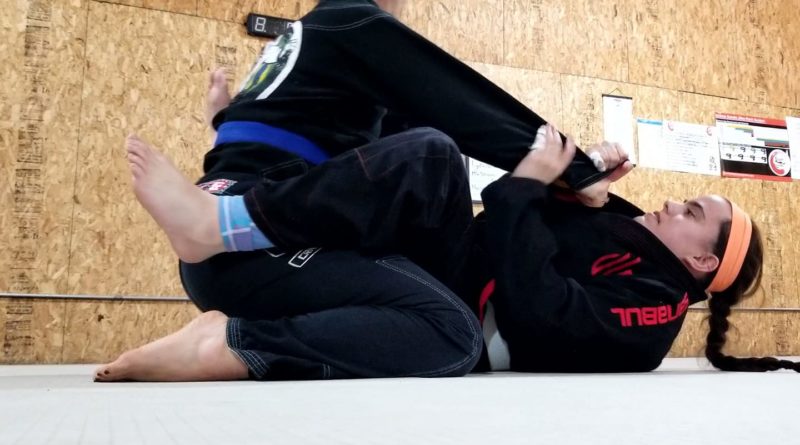Brazilian Jiu-Jitsu, POTS, and Me

Disclaimer: This is not to be taken as medical advice or a comprehensive breakdown of the condition as a whole, Michaela is simply sharing her experiences. She is not a medical professional, nor does she claim to be and sources are cited where needs be. There are varying levels of POTS and people experience different arrays of symptoms. Please consult your doctor on any health concerns you may have.
So POTS and BJJ? What’s it like? Grappling Insider’s Lucy Wynne speaks to POTS sufferer and BJJ enthusiast Michaela Miller about her experiences, and advice she would give others, who also suffer with the condition who may be thinking of starting Brazilian Jiu Jitsu.
Michaela is 26, and was diagnosed with POTS in 2018; she started training BJJ in December 2020 after coming across Sam Harris and Joe Rogan talking about it on JRE. Originally she began training in her basement and now trains at Lashley Training Center in Mount Vernon, Ohio. Michaela expands on her diagnosis,
“I was diagnosed in 2018 shortly after I fainted one morning and hit my head on the bathroom sink. It is difficult to know precisely when I developed the disorder but it didn’t start impacting me until a few weeks before I was diagnosed. One of my doctors says it’s likely that I’ll have it for a very long time, though the current research is somewhat inconclusive as to the possibility of remission. Some people can achieve a kind of remission, but my medical team and I are more focused on ways I can live normally than seeking what we view as an unlikely remission.”
What is POTS?
According to the Cleveland Clinic, Postural Orthostatic Tachycardia Syndrome (POTS) is a condition that affects blood flow. It causes the development of symptoms – usually lightheadedness, fainting and an uncomfortable, rapid increase in heartbeat – that come on when standing up from a reclining position and are relieved by sitting or lying back down. When speaking of her own experiences suffering with POTS Michaela says,
“The most life-changing aspect for me has been the inability to stand or walk for a long period of time. Over time, I have learned to do virtually all normal activities such as showering and cooking dinner while sitting. I have different chairs for different activities – a tall chair for the kitchen, shower chair for the bathroom, and wheelchair for going for ‘walks.’”
What Are Ways to Manage/ Treat POTS?
According to Dysautonomia International , the typical aspects of treatment for POTS involves increased fluid and salt intake, smaller food portions more regularly, avoiding alcohol, compression garments to boost blood flow, certain medications (to manage high heart rates and boost fluid retention), and exercise. Many people with POTS also end up needing mobility aids.
Michaela says, “I started with a cane and progressed to needing forearm crutches before making the decision to start using a wheelchair in order to get around without having to stop and sit down so frequently.”
BJJ and POTS
BJJ and POTS may seem like a combination not meant to be, but that is not the case for Michaela Miller, nor should it be for any other POTS sufferers. When asking Michaela if she would recommend BJJ to other people that have POTS she says, “Absolutely! Exercise is a crucial component in managing POTS and it can be very difficult for sufferers to find a form of exercise that works for them. The community aspect of BJJ is also very beneficial since chronic illness can be very isolating. Of course, it is important to talk to one’s doctor before beginning a new exercise regime.”
However, BJJ isn’t easy and having POTS most definitely doesn’t make it any easier. Michaela expands,
“For a while, I thought I needed to be healthy enough to stand and walk in order to practice BJJ. When it finally dawned on me that this may not be possible for a very long time, I decided to start learning. I have to practice a modified version of the sport; I don’t usually wear my Gi top due to my internal thermostat no longer working properly. When I hit sweeps, I take mount on my elbows so the postural change is less severe. I can’t start from standing or learn takedowns and I have to modify some submissions. It can be discouraging to watch my teammates roll/drill every round while I have to take breaks. I just remind myself that some mat time is better than no mat time.”
She also expands, “Paradoxically, exercise intolerance is a symptom of POTS while exercise remains part of the treatment. When I’m on the mats exerting myself, my symptoms tend to be more noticable and intense. Overall, however, I would say that BJJ has made little difference in my overall physical health while being a huge boost for my mental health. I often feel sick after training but my hope is that as I continue to increase my endurance, perhaps I will eventually see some improvement in my symptoms overall.”
With regards to others in the community Michaela says, “There are a few of us out there! I have found a small handful of folks with POTS who practice BJJ and with whom I can discuss hacks and tricks to stay on the mat longer.”
Even though Michaela has been training for just over a year, and suffers with POTS, she is super enthusiastic and also has her own Facebook page documenting her POTS and BJJ journey. When it comes to favorite positions and submissions she says, “I really enjoy holding someone under side control. I also spend a lot of time playing guard.” Her favorite submission also comes from the guard, she goes on to expand, “Double armbar from guard is my favorite submission to drill, though I’ve never hit one in a live roll.”
Picking the Right Rolling Partners
Fortunately Michaela has had nothing but good experiences when it has come to rolling with people and has been treated with respect. However, if you have POTS, it is important to know your own limits and to warn your partners incase you pass out (and not from a choke) Michaela expands on her own experiences,
“I have a somewhat difficult time disclosing my illness. I want to be like everyone else and don’t want it to be the first thing new rolling partners know about me. I just tell my partners that I may pass out and that it is normal for me. There is a sense of duty that I think we all feel to be the best we can be so we don’t deprive anyone of the ability to learn. When I have to stop a drill or a roll, I feel bad that my partner also has to stop. My teammates are incredibly accepting of my limits and respectful to not make a big deal when I overheat or faint on the mat. I have yet to encounter someone in a gym with whom I would not roll. My coaches know that I keep my medical alert bracelet on my water bottle, this is something that I would recommend to anyone practicing BJJ with an illness.”
To seal off the interview Michaela says, “I am very thankful to the BJJ community for supporting me. I hope my answers are helpful to someone out there.”

